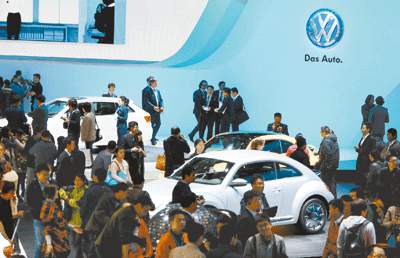
CHINA has halved sales tax on small cars to revive growth in the world’s biggest automobile market, a move likely to provide a limited boost to carmakers including Volkswagen AG, the company embroiled in a global diesel emissions scandal.
The cut in sales tax on cars with less than 1.6 liter engines takes effect today and lasts through the end of 2016.
Automobiles in this segment account for nearly 70 percent of total sales in China.
Volkswagen makes five of the 10 best-selling models in the category, although sales overall in China for the German automaker have turned soft this year, requiring the company to counter with generous incentives.
Analysts and other experts say the tax cut, a repeat of a similar policy move after the global economic crisis in 2008, was not likely to trigger a turnaround in the overall market.
“The fact that growth has remained weak this year in spite of a period of sharply falling retail prices suggests that poor consumer sentiment and economic uncertainty — rather than pricing and affordability — are to blame for weak demand,” analysts at research firm Bernstein wrote in a research note.
It would likely provide some sales lift, nonetheless.
Yale Zhang, the head of Shanghai-based consulting firm Automotive Foresight, said the tax cut could lead to additional sales of about 100,000 vehicles per month for the rest of the year. About 1.7 million cars were sold in China in August.
Rampant discounts and other incentives were already in place in the market and there has been a general decline in retail prices of cars in recent months, Zhang said.
“Some are assuming lower sales taxes for new car purchases are not going to help much, but a government move like this is so heavily and widely publicized by Chinese media that it is more effective than deals advertised by companies,” he said.
Zhang said all top-selling sub-1.6-liter cars would get a lift from the tax cut, but especially SUV and multi-purpose vans that have already been selling strongly in China — namely the Great Wall Haval H6 and the Volkswagen Tiguan, both SUVs, as well as some MPV models from Wulin and Baojun, brands owned and operated by General Motors Co and its partner SAIC Motor Corp.
According to Automotive Foresight’s data, China’s best-selling sub-1.6-liter vehicles are, from the top, the Wulin Hongguang MPV, VW’s New Lavida, the H6, the VW Jetta, the VW New Santana, the VW Sagitar, the Tiguan, the Hyundai Elantra, and the Toyota Corolla. “All those cars are going to benefit from the tax cut,” Zhang said.
For Volkswagen, the tax cut offers much needed relief. China has accounted for more than half of VW’s profit in recent years.
But the carmaker has begun reining in Chinese output, wages and other costs, according to industry source, as it tries to cope with a sharp slowdown in the world’s biggest vehicle market.
Volkswagen’s Chinese joint venture, FAW-VW, is cancelling staff bonuses and cutting shifts at its plants near Changchun, northeastern China, people with knowledge of the matter said.
The bonuses being scrapped typically account for more than half of the assembly-line workers’ take-home pay. Volkswagen’s high-end Audi brand also said earlier last month it had eased back output at its Chinese plants, trimming the working week to five days from seven in response to lower demand for models such as the A6 saloon.
Car sales in China were flat in the first eight months of the year and could contract in 2015 for the first time since the market took off in the late 1990s.
Many analysts expect auto sales growth to hold in low single-digits in coming years and global carmakers are cutting production and reining in wages and other costs.(SD-Agencies)
|

